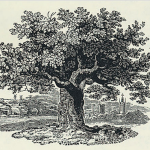This is an article by Egbert T. Bush about the village of Cherryville in Franklin Township, Hunterdon County. It serves as a follow-up to my article on the earliest owners of the Cherryville Tavern, back when the village was known as Anderson Town, after the early tavern owner, James Anderson.
Rake
John Rake, originally Johannes Recher, was present in Amwell Township as early as 1760.
From Prallsville to Rake’s Farm
part three in the series, The Route Not Taken
This is part three of my series on the Delaware Flemington Railroad Company. Part One was an article by Egbert T. Bush describing the birth and death of the company. Part Two described the reasons for the company’s failure and how its directors fared afterwards. This article will focus on the route that was planned for the new rail line.1
The Rake Cemetery
In 2009, I wrote several articles concerning the Rake Cemetery in Sandbrook. They were published in the Delaware Township newsletter known as the Post, which is no longer being published. There is a website for the Post where its articles are archived, but it is very hard to use, and some links just don’t work. So, I’ve decided to revise and republish those articles here.
Rake Family Tree
Johannes Rake, an immigrant from Switzerland, is thought to have arrived in Pennsylvania in 1738. He was present in Hunterdon County as early as 1761 when he witnessed the will of Jacob Houshel. Given that his first child was not born until 1768, it seems likely that Rake married his first wife in America. The birthdate for second wife Elsa seems very late, nearly two generations younger than John Rake. More information is needed.
Family Burying Grounds Matter
The following is the keynote speech I delivered on September 19, 2015 for the 2nd Annual Cemetery Seminar, sponsored by the Hunterdon Co. Historical Society and others. It is somewhat modified to make it more readable, less like a speech.
John Rake Jr. and The Evil Influence
Alcohol consumption in the 19th century is always an interesting subject because of how much alcohol was consumed back then. It is one of the ways we measure how much things have changed. We are far more aware now of the dangers of addiction, but in the 1820’s, the county coroner could tell you it was sometimes fatal. Here is the sad story of John Rake, a member of that same family I have written about in other posts.
Going Going Gone
I learned yesterday that the owners of the old Rake house on Sandbrook-Headquarters Road had taken down the remains of the house after it had been gutted by fire. This is disappointing, as it appeared that there was enough of the old stone walls to incorporate into a new building. Clearly not everyone sees the value in preserving such things. You can see a picture of the house and get the story of the fire here.
Else Rake
Some time ago I wrote a series of articles on the Rake Cemetery in Delaware Township. You can find the first of them here. In the second post (here), I mentioned that both John and Else Rake did not have gravestones in this cemetery, even though they were the first owners of the property. I also speculated that Else Rake, might be buried in the Rockafellar Cemetery in East Amwell. I have since learned that is not the case.
The Rake-Sergeant House
This past month there were several fires in southern Hunterdon County, all of them accidental. One of those fires gutted a house that I had researched many years ago, so I, along with current and past owners, feel somewhat heartbroken that this lovely home has been destroyed. It is located a short distance south of the village of Sand Brook, along the Sand Brook-Headquarters Road.
